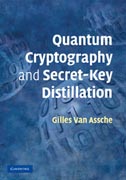
Quantum cryptography (or quantum key distribution) is a state-of-the-art technique that exploits properties of quantum mechanics to guarantee the secure exchange of secret keys. This 2006 text introduces the principles and techniques of quantum cryptography, setting it in the wider context of cryptography and security, with specific focus on secret-key distillation. The book starts with an overview chapter, progressing to classical cryptography, information theory (classical and quantum), and applications of quantum cryptography. The discussion moves to secret-key distillation, privacy amplification and reconciliation techniques, concluding with the security principles of quantum cryptography. The author explains the physical implementation and security of these systems, enabling engineers to gauge the suitability of quantum cryptography for securing transmission in their particular application. With its blend of fundamental theory, implementation techniques, and details of recent protocols, this book will be of interest to graduate students, researchers, and practitioners in electrical engineering, physics, and computer science. INDICE: 1. Introduction; 2. Classical cryptography; 3. Information theory; 4. Quantum information theory; 5. Cryptosystems based on quantum key distribution; 6. General results on secret-key distillation; 7. Privacy amplification using hash functions; 8. Reconciliation; 9. Non-binary reconciliation; 10. The BB84 protocol; 11. Protocols with continuous variables; 12. Security analysis of quantum key distribution; Appendix 1. Symbols and abbreviations.
- ISBN: 978-1-107-41063-3
- Editorial: Cambridge University Press
- Encuadernacion: Rústica
- Páginas: 276
- Fecha Publicación: 04/10/2012
- Nº Volúmenes: 1
- Idioma: Inglés
